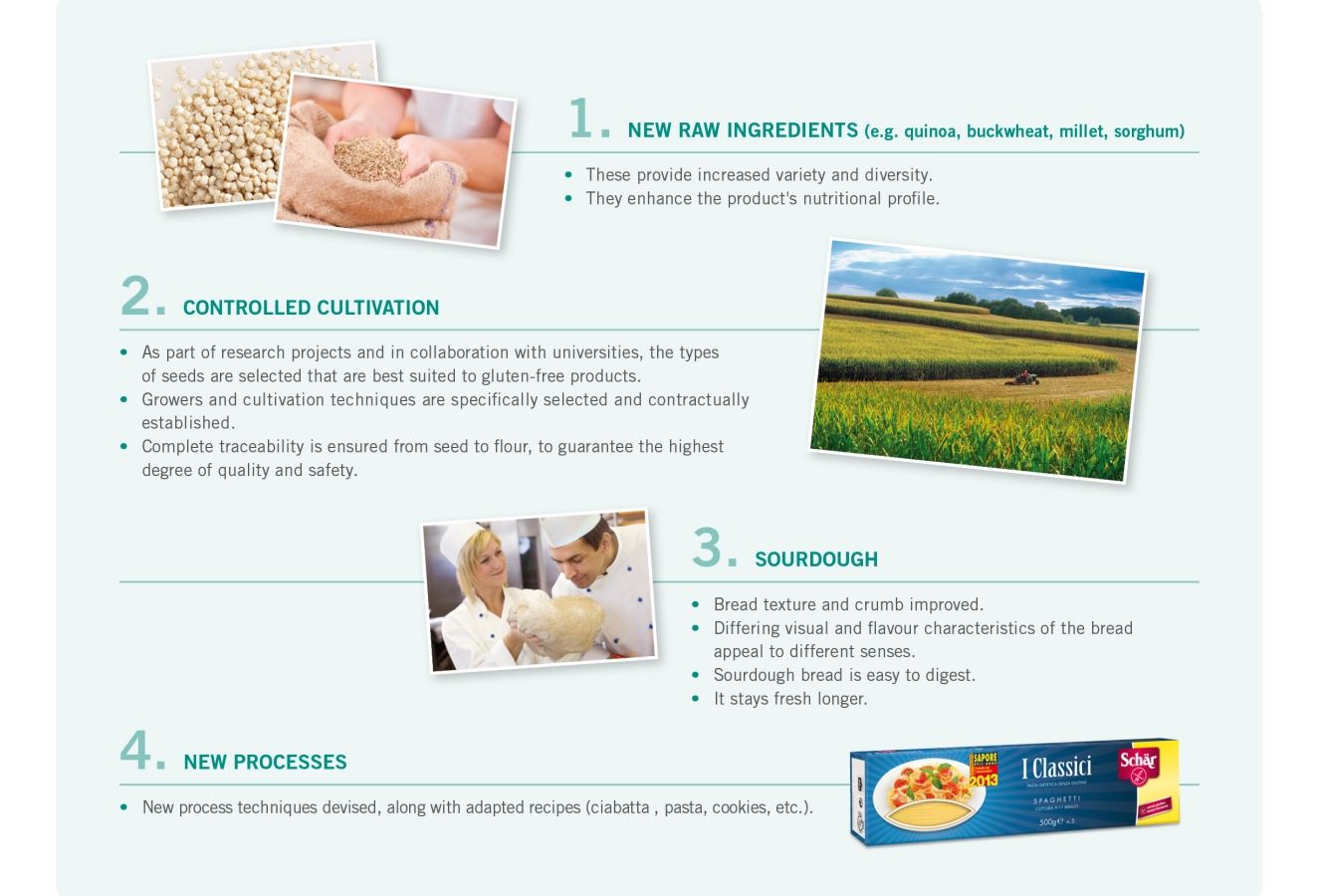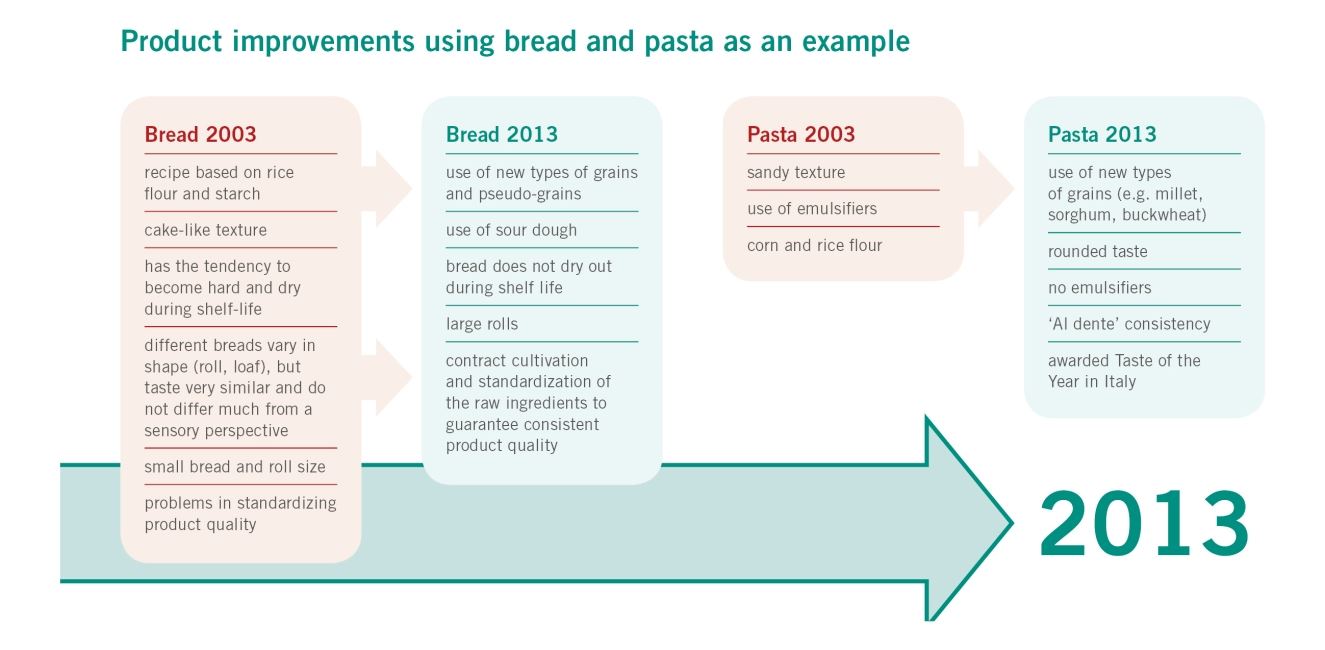R&D 2003–2013: From research to product development

At the end of 2013, the Dr. Schär Research and Development Department celebrated its tenth anniversary. Virna Cerne, head of the R&D center describes the milestones of the last few years – in particular how the quality of gluten-free products has improved and gives a view on what might be expected in the future in this exciting market.
The task of the Dr. Schär R&D Department is to design the Dr. Schär products so that special dietary needs become a pleasure and fulfil the requirements of a balanced diet. We are increasingly developing products to match new requirements in our society. This includes making gluten-free eating out easier. Research is fundamental to all product quality improvements. Quality and research now go hand in hand. In the last ten years numerous projects have been initiated at various levels of research in order to achieve and maintain this improvement in quality. From beginning with basic research investigating new raw ingredients, to work in relation to sensor technology, to packaging and the development of new product technologies. Research and development must always be at the forefront, as only with such knowledge is it possible to constantly develop innovative products and improve existing ones.
Formation and evolution of the R&D department
Since 2003, the R&D department has been located in the Area Science Park in Trieste, Italy, where staff has access to cutting edge equipment as well as being surrounded by other researchers. Prior to this, the R&D department was part of quality assurance. At the beginning, only three researchers were on staff. Even then, there was a great deal of investment in laboratory equipment and in personnel. There are now twelve members of staff in Trieste, with a further eight at other production sites who are responsible for the continuous improvement and further development of gluten-free products. Also, the number of individual projects that the team looks after has increased significantly in the last ten years: from almost ten at the beginning to the current 30 development projects, around eight research projects and five technology projects.
Anniversary symposium
To celebrate the tenth anniversary of the R&D department, Dr. Schär held an international symposium in Trieste, in order to give the public some insight into the work of the R&D department. While most sessions were on the subject of gluten-free or celiac disease, either for doctors, researchers, laboratory technicians or patients, the focus of this symposium was scientific research in the field of gluten-free products and gluten-free nutrition. The participants experienced first-hand what goes on behind the scenes of R&D, what is being worked on right now and what were the most successful long-term studies now entering the daily production process. Another key objective in this field is to develop tasty foods that make patients lives easier and improve their chances of maintaining their dietary regime – a nice tasting product makes compliance easier. Along with research, the agenda also included topics related to alternative grains and pseudo-grains , such as millet, sorghum, buckwheat, quinoa, teff and oats. All these grains enhance gluten-free foods in a natural way and broaden the otherwise very limited menu for the patients. Thanks to their natural composition, the use of these ingredients improves not only the taste and texture of the products, but also their nutritional value. In the meantime, buckwheat and millet have become firmly established in the Dr. Schär range.
The milestones of the R&D department
Various components have contributed to the change of the range and quality of gluten-free products in the last ten years:


Significance of research in the future
The research field will also play a major role in the future for the Dr. Schär company, becoming more and more important for continuous product improvement. Collaboration with universities and other research centres represents an important factor for the successful implementation of projects. Then as now, attention is focussed on the quality of raw ingredients used in products, as this is the basis for the sensory appeal and the nutritional profile. The grains used, the controlled cultivation and cultivation conditions, the processing of the grains and safety in relation to gluten-free status are essential factors for high-quality products. R&D is and remains a driving force, and as such will become more significant in a strongly competitive market. The future challenge will be to maintain the lead through impressive product quality.
Gluten-free – not just for those with celiac disease
Virna Cerne assumes that in the future there will no longer be a difference between products for those with celiac disease and those who do not. As a result of the changed regulation that moved the gluten-free category from diet products (9/398 EEC, amended by 2009/39) into EU 1169/2011 (REGULATION EU NO. 1169/2011 OF THE EUROPEAN PARLIAMENT AND OF THE COUNCIL on the provision of information to consumers), gluten-free products are effectively treated in the same way as general food. The consequence of this is that the products are no longer considered simply as 'diet products' for the albeit lifelong gluten-free diet and for some consumers are seen as an alternative to the usual wheat products. Nevertheless, Dr. Schär will concentrate on designing products which provide an alternative for celiac and gluten intolerant patients enabling them to follow a balanced, gluten-free diet. As well as the raw ingredients rice and corn , the cultivation of less well-known grains and pseudo grain types is promoted, so that in the future we can broaden and enhance the product range.
There will of course be a gluten-free product category that, thanks to its fine flavor and high nutritional value, will also be important for the wider general public; allowing them to introduce greater variety into their intake and to reduce their consumption of wheat. It will be the task of the Research and Development Department to develop products with excellent flavor and consistent quality.
There will of course be a gluten-free product category that, thanks to its fine flavor and high nutritional value, will also be important for the wider general public; allowing them to introduce greater variety into their intake and to reduce their consumption of wheat. It will be the task of the Research and Development Department to develop products with excellent flavor and consistent quality.
Author
VIRNA CERNE
- Head of the Dr. Schär Research and Development Department in the Area Science Park, Trieste, Italy
www.drschaer-institute.com
